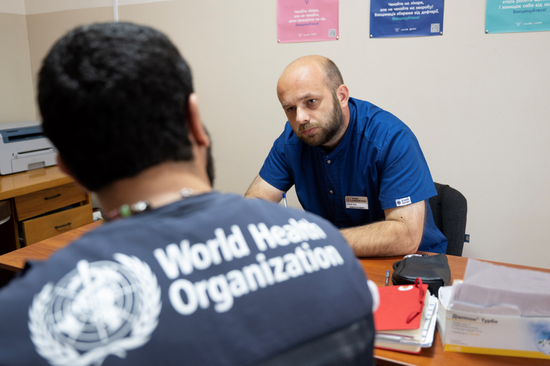
As a part of WHO’s mandate in the countries in which it has activated the incident management system, PRSEAH (prevention and response to sexual exploitation abuse and harassment) is a core action to be implemented. This course teaches the basics on PRSEAH including the 6 core principles, accountability frameworks and how to support a survivor/victim in the Ukraine emergency operation.
Photo credits: WHO / Christopher Black
Language: English
Health topic
Course information
This course is also available in the following languages:
Course overview: Working with partners, the UN system, government authorities and collaborators on public health is a key component on prevention and response to sexual exploitation and abuse. At the same time, SEA (sexual exploitation and abuse) can be understood to have different risks and mitigation measures depending on the country, and regional context. This course is directed specifically to public health workers in Ukraine who are being strongly supported by the WHO. It teaches them to understand why SEA matters to them as a member state, and affiliate of the humanitarian system, as well as how they can hold UN partners accountable, cooperate in preventing SEA and supporting survivors and victims in Ukraine.
Course duration: Approximately 1 hour.
Certificates: A Certificate of Achievement will be available to participants who score at least 80% of the total points available in the final assessment. Participants who receive a Certificate of Achievement can also download an Open Badge for this course. Click here to learn how.
What you'll learn
- Outline that SEAH (sexual exploitation abuse and harassment) is an issue in Ukraine
- Explain why PRSEAH as a concept is of relevance to you as a public health affiliate in Ukraine
- Describe how confidentially, and safely report concerns about SEA (sexual exploitation and abuse)
- Describe how to hold the UN and humanitarian partners accountable for their adherence to humanitarian standards
- Recall how to provide very basic support to a survivor or victim of SEA in Ukraine
Course contents
Introduction:
The introduction explains the objectives of the course, how it is structured, and what the participants will learn.Module 1: What is sexual exploitation and abuse (SEA)?:
By the end of this module, you will: describe what SEA (sexual exploitation and abuse) actually is, as defined by the international humanitarian community, why it is a risk in humanitarian contexts, and what its consequences are.Module 2: General context of the United Nations, gender, GBV (gender based violence) and SEA in Ukraine:
By the end of this module, you will: explain the history of the United Nations in Ukraine, the significance of Ukraine being a member state of both the United Nations and WHO as well as why this is relevant to Ukraine’s candidacy as a European Union member state. You will also outline the international legal conventions that Ukraine has ratified, and how this relates to gender, gender-based violence (including sexual exploitation and abuse) and women’s rights issues in Ukraine.Module 3: Vulnerabilities and SEA issues in Ukraine:
By the end of this module, you will: recall the ways that the unfortunate emergency in Ukraine has exacerbated gender inequalities and disparities and created a situation where gender-based violence, including in the form of sexual exploitation and abuse is of a heightened risk.Module 4: Supporting a survivor of SEA:
By the end of this module, you will: describe the core humanitarian standard for support survivors and victims of gender-based violence, known as the survivor centred approach and its core tenets of safety, confidentiality, respect and non-discrimination.Module 5: Reporting and Accountability:
By the end of this module, you will: explain exactly where, and how to report SEA and where you can seek guidance should you have any concerns or questions. It will also help you to list what standards of conduct can be expected from WHO, UN and humanitarian personnel.
Enroll me for this course
Certificate Requirements
- Gain a Record of Achievement by earning at least 80% of the maximum number of points from all graded assignments.
- Gain an Open Badge by completing the course.